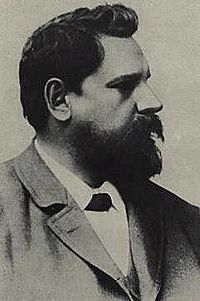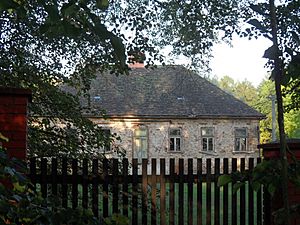Zdeněk Fibich facts for kids
Quick facts for kids
Zdeněk Fibich
|
|
|---|---|

Zdeněk Fibich
|
|
| Born | 21 December 1850 |
| Died | 15 October 1900 (aged 49) |
| Occupation | Composer |
Zdeněk Fibich (born December 21, 1850, in Všebořice – died October 15, 1900, in Prague) was a famous Czech composer. He wrote many kinds of classical music.
His works include pieces for small groups of instruments, like two string quartets and a piano trio. He also wrote symphonic poems and three symphonies. Fibich created at least seven operas, with Šárka and The Bride of Messina being his most well-known.
He also composed melodramas, which are plays with music, like the big story Hippodamia. He wrote church music, including a short mass. One of his largest projects was a cycle of 376 piano pieces called Moods, Impressions, and Reminiscences. This cycle was like a musical diary about his love for a piano student. One piece from this collection became the famous short work Poème, which is what most people remember him for today.
Contents
Early Life and Learning Music
Zdeněk Fibich is not as famous as other Czech composers like Antonín Dvořák or Bedřich Smetana. This is partly because he lived when Czech nationalism was growing strong in the Habsburg Empire. While Smetana and Dvořák focused on creating music that sounded very Czech, Fibich's background was a bit different.
His father was a Czech forest worker, and Zdeněk spent his early years on large wooded estates. But his mother was from Vienna, Austria, and was German. She started teaching him piano when he was six years old.
He was homeschooled by his mother until he was nine. Then, he went to a German-speaking school in Vienna for two years. After that, he attended a Czech-speaking school in Prague until he was 15.
Later, he went to Leipzig, Germany, for three years. There, he studied piano with Ignaz Moscheles and learned how to compose music with Salomon Jadassohn and Ernst Richter. He also spent time studying in Paris and Mannheim.
After finishing his studies, Fibich lived with his parents in Prague. During this time, he wrote his first opera, Bukovina.
His Life and Family
When he was 23, Zdeněk Fibich married Růžena Hanušová. They moved to Vilnius, a city in Lithuania, where he worked as a choirmaster. Sadly, his wife and their twin babies passed away while they were living there.
In 1874, he returned to Prague and stayed there until he died in 1900. A year later, in 1875, Fibich married Růžena's sister, Betty Fibichová, who was a singer.
Later in his life, in 1895, he found inspiration in his former student, Anežka Schulzová. She wrote the stories (called libretti) for his later operas, including Šárka. She also inspired his piano cycle Moods, Impressions, and Reminiscences.
His Music Career
Fibich had a mixed education, living in Germany, France, and Austria, as well as his home country, Bohemia. He spoke both German and Czech very well.
In his music for instruments, Fibich often followed the style of German Romantic composers. He was influenced by musicians like Weber, Mendelssohn, Schumann, and later Wagner. Many of his early operas and nearly 200 of his early songs were in German. German critics liked these works, but Czech critics did not always agree.
Most of Fibich's operas were in Czech, even though some were based on stories by non-Czech writers like Shakespeare. In his music for small groups of instruments, he often used Czech folk melodies and dance rhythms, like the dumka.
Fibich was the first to write a Czech nationalist tone poem called Záboj, Slavoj a Luděk. This piece later inspired Smetana's famous work, Má vlast. Fibich was also the first to use the polka dance in a piece for a small group of instruments.
Challenges in Prague
After he came back to Prague in 1874, Fibich's music faced some tough reactions. This was because he, like Smetana, liked Richard Wagner's ideas about opera. Wagner's style was new and sometimes not popular with traditional audiences.
Fibich's strong opinions about music and his very Wagner-like operas, such as Hedy and Šárka, made things harder. He and a music expert named Otakar Hostinský were not welcomed by the main music groups in Prague. This included the National Theatre and the Prague Conservatory.
Because of this, Fibich had to teach composition privately. However, his private studio was well-respected. Many students came to him, including important future musicians and critics. After Fibich died, his students helped make his music more known.
There is a Fibich Society today that helps organize projects about his music.
Famous Works
Fibich's most famous piece is Poème. It started as a piano piece in his collection Moods, Impressions and Reminiscences. He later used this music in his symphonic idyll At Twilight.
After Fibich died, a violinist named Jan Kubelik changed the piece for violin and called it Poème. This version has been published and recorded many times. It was even used for a popular song called My Moonlight Madonna with English words.
See also
 In Spanish: Zdeněk Fibich para niños
In Spanish: Zdeněk Fibich para niños
 | Toni Morrison |
 | Barack Obama |
 | Martin Luther King Jr. |
 | Ralph Bunche |


